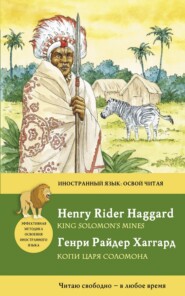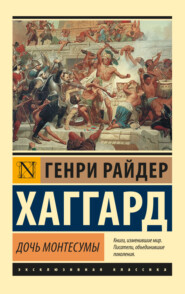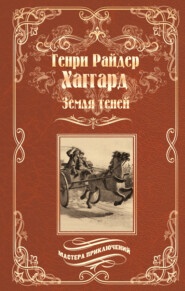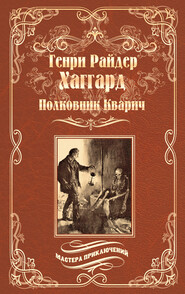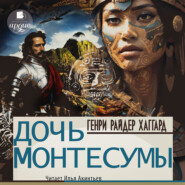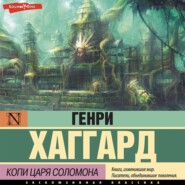По всем вопросам обращайтесь на: info@litportal.ru
(©) 2003-2024.
✖
She: A History of Adventure
Автор
Серия
Год написания книги
1887
Настройки чтения
Размер шрифта
Высота строк
Поля
Leo always takes a cheerful view of things.
There being no help for it, after seeing the others into theirs I tumbled into my own litter, and very comfortable I found it. It appeared to be manufactured of cloth woven from grass-fibre, which stretched and yielded to every motion of the body, and, being bound top and bottom to the bearing pole, gave a grateful support to the head and neck.
Scarcely had I settled myself when, accompanying their steps with a monotonous song, the bearers started at a swinging trot. For half an hour or so I lay still, reflecting on the very remarkable experiences that we were going through, and wondering if any of my eminently respectable fossil friends down at Cambridge would believe me if I were to be miraculously set at the familiar dinner-table for the purpose of relating them. I do not want to convey any disrespectful notion or slight when I call those good and learned men fossils, but my experience is that people are apt to fossilise even at a University if they follow the same paths too persistently. I was getting fossilised myself, but of late my stock of ideas has been very much enlarged. Well, I lay and reflected, and wondered what on earth would be the end of it all, till at last I ceased to wonder, and went to sleep.
I suppose I must have slept for seven or eight hours, getting the first real rest that I had had since the night before the loss of the dhow, for when I woke the sun was high in the heavens. We were still journeying on at a pace of about four miles an hour. Peeping out through the mist-like curtains of the litter, which were ingeniously fixed to the bearing pole, I perceived to my infinite relief that we had passed out of the region of eternal swamp, and were now travelling over swelling grassy plains towards a cup-shaped hill. Whether or not it was the same hill that we had seen from the canal I do not know, and have never since been able to discover, for, as we afterwards found out, these people will give little information upon such points. Next I glanced at the men who were bearing me. They were of a magnificent build, few of them being under six feet in height, and yellowish in colour. Generally their appearance had a good deal in common with that of the East African Somali, only their hair was not frizzed up, but hung in thick black locks upon their shoulders. Their features were aquiline, and in many cases exceedingly handsome, the teeth being especially regular and beautiful. But notwithstanding their beauty, it struck me that, on the whole, I had never seen a more evil-looking set of faces. There was an aspect of cold and sullen cruelty stamped upon them that revolted me, and which in some cases was almost uncanny in its intensity.
Another thing that struck me about them was that they never seemed to smile. Sometimes they sang the monotonous song of which I have spoken, but when they were not singing they remained almost perfectly silent, and the light of a laugh never came to brighten their sombre and evil countenances. Of what race could these people be? Their language was a bastard Arabic, and yet they were not Arabs; I was quite sure of that. For one thing they were too dark, or rather yellow. I could not say why, but I know that their appearance filled me with a sick fear of which I felt ashamed. While I was still wondering another litter came up alongside of mine. In it – for the curtains were drawn – sat an old man, clothed in a whitish robe, made apparently from coarse linen, that hung loosely about him, who, I at once jumped to the conclusion, was the shadowy figure that had stood on the bank and been addressed as “Father.” He was a wonderful-looking old man, with a snowy beard, so long that the ends of it hung over the sides of the litter, and he had a hooked nose, above which flashed out a pair of eyes as keen as a snake’s, while his whole countenance was instinct with a look of wise and sardonic humour impossible to describe on paper.
“Art thou awake, stranger?” he said in a deep and low voice.
“Surely, my father,” I answered courteously, feeling certain that I should do well to conciliate this ancient Mammon of Unrighteousness.
He stroked his beautiful white beard, and smiled faintly.
“From whatever country thou camest,” he said, “and by the way it must be from one where somewhat of our language is known, they teach their children courtesy there, my stranger son. And now wherefore comest thou unto this land, which scarce an alien foot has pressed from the time that man knoweth? Art thou and those with thee weary of life?”
“We came to find new things,” I answered boldly. “We are tired of the old things; we have come up out of the sea to know that which is unknown. We are of a brave race who fear not death, my very much respected father – that is, if we can get a little information before we die.”
“Humph!” said the old gentleman, “that may be true; it is rash to contradict, otherwise I should say that thou wast lying, my son. However, I dare to say that ‘She-who-must-be-obeyed’ will meet thy wishes in the matter.”
“Who is ‘She-who-must-be-obeyed’?” I asked, curiously.
The old man glanced at the bearers, and then answered, with a little smile that somehow sent my blood to my heart – “Surely, my stranger son, thou wilt learn soon enough, if it be her pleasure to see thee at all in the flesh.”
“In the flesh?” I answered. “What may my father wish to convey?”
But the old man only laughed a dreadful laugh, and made no reply.
“What is the name of my father’s people?” I asked.
“The name of my people is Amahagger” (the People of the Rocks).
“And if a son might ask, what is the name of my father?”
“My name is Billali.”
“And whither go we, my father?”
“That shalt thou see,” and at a sign from him his bearers started forward at a run till they reached the litter in which Job was reposing (with one leg hanging over the side). Apparently, however, he could not make much out of Job, for presently I saw his bearers trot forward to Leo’s litter.
And after that, as nothing fresh occurred, I yielded to the pleasant swaying motion of the litter, and went to sleep again. I was dreadfully tired. When I woke I found that we were passing through a rocky defile of a lava formation with precipitous sides, in which grew many beautiful trees and flowering shrubs.
Presently this defile took a turn, and a lovely sight unfolded itself to my eyes. Before us was a vast cup of green from four to six miles in extent, in the shape of a Roman amphithe-atre. The sides of this great cup were rocky, and clothed with bush, but the centre was of the richest meadow land, studded with single trees of magnificent growth, and watered by meandering brooks. On this rich plain grazed herds of goats and cattle, but I saw no sheep. At first I could not imagine what this strange spot could be, but presently it flashed upon me that it must represent the crater of some long-extinct volcano which had afterwards been a lake, and was ultimately drained in some unexplained way. And here I may state that from my subsequent experience of this and a much larger, but otherwise similar spot, which I shall have occasion to describe byand-by, I have every reason to believe that this conclusion was correct. What puzzled me, however, was, that although there were people moving about herding the goats and cattle, I saw no signs of any human habitation. Where did they all live? I wondered. My curiosity was soon destined to be gratified. Turning to the left the string of litters followed the cliffy sides of the crater for a distance of about half a mile, or perhaps a little less, and then halted. Seeing the old gentleman, my adopted “father,” Billali, emerge from his litter, I did the same, and so did Leo and Job. The first thing I saw was our wretched Arab companion, Mahomed, lying exhausted on the ground. It appeared that he had not been provided with a litter, but had been forced to run the entire distance, and, as he was already quite worn out when we started, his condition now was one of great prostration.
On looking round we discovered that the place where we had halted was a platform in front of the mouth of a great cave, and piled upon this platform were the entire contents of the whale-boat, even down to the oars and sail. Round the cave stood groups of the men who had escorted us, and other men of a similar stamp. They were all tall and all handsome, though they varied in their degree of darkness of skin, some being as dark as Mahomed, and some as yellow as a Chinese. They were naked, except for the leopard-skin round the waist, and each of them carried a huge spear.
There were also some women among them, who, instead of the leopard-skin, wore a tanned hide of a small red buck, something like that of the oribé, only rather darker in colour. These women were, as a class, exceedingly good-looking, with large, dark eyes, well-cut features, and a thick bush of curling hair – not crisped like a negro’s – ranging from black to chestnut in hue, with all shades of intermediate colour. Some, but very few of them, wore a yellowish linen garment, such as I have described as worn by Billali, but this, as we afterwards discovered, was a mark of rank, rather than an attempt at clothing. For the rest, their appearance was not quite so terrifying as that of the men, and they sometimes, though rarely, smiled. As soon as we had alighted they gathered round us and examined us with curiosity, but without excitement. Leo’s tall, athletic form and clear-cut Grecian face, however, evidently excited their attention, and when he politely lifted his hat to them, and showed his curling yellow hair, there was a slight murmur of admiration. Nor did it stop there; for, after regarding him critically from head to foot, the handsomest of the young women – one wearing a robe, and with hair of a shade between brown and chestnut – deliberately advanced to him, and, in a way that would have been winning had it not been so determined, quietly put her arm round his neck, bent forward, and kissed him on the lips.
I gave a gasp, expecting to see Leo instantly speared; and Job ejaculated, “The hussy – well, I never!” As for Leo, he looked slightly astonished; and then, remarking that we had clearly got into a country where they followed the customs of the early Christians, deliberately returned the embrace.
Again I gasped, thinking that something would happen; but, to my surprise, though some of the young women showed traces of vexation, the older ones and the men only smiled slightly. When we came to understand the customs of this extraordinary people the mystery was explained. It then appeared that, in direct opposition to the habits of almost every other savage race in the world, women among the Amahagger are not only upon terms of perfect equality with the men, but are not held to them by any binding ties. Descent is traced only through the line of the mother, and while individuals are as proud of a long and superior female ancestry as we are of our families in Europe, they never pay attention to, or even acknowledge, any man as their father, even when their male parentage is perfectly well known. There is but one titular male parent of each tribe, or, as they call it, “Household,” and he is its elected and immediate ruler, with the title of “Father.” For instance, the man Billali was the father of this “household,” which consisted of about seven thousand individuals all told, and no other man was ever called by that name. When a woman took a fancy to a man she signified her preference by advancing and embracing him publicly, in the same way that this handsome and exceedingly prompt young lady, who was called Ustane, had embraced Leo. If he kissed her back it was a token that he accepted her, and the arrangement continued until one of them wearied of it. I am bound, however, to say that the change of husbands was not nearly so frequently as might have been expected. Nor did quarrels arise out of it, at least among the men, who, when their wives deserted them in favour of a rival, accepted the whole thing much as we accept the income-tax or our marriage laws, as something not to be disputed, and as tending to the good of the community, however disagreeable they may in particular instances prove to the individual.
Вы ознакомились с фрагментом книги.
Приобретайте полный текст книги у нашего партнера:
Приобретайте полный текст книги у нашего партнера:






